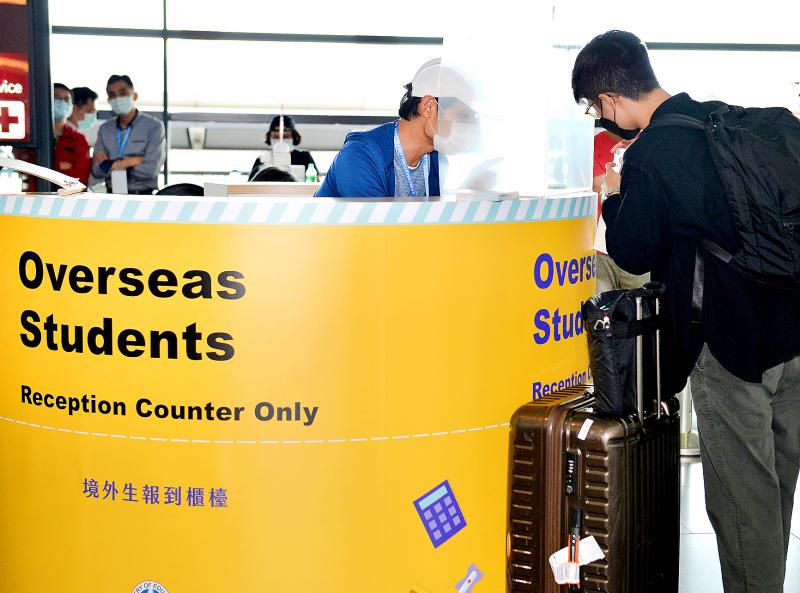More than 100 people who had close contact with a Japanese student who tested positive for COVID-19 on her arrival in Japan from Taiwan are to have their blood tested to see if they have developed antibodies for the virus, the Central Epidemic Command Center (CECC) said yesterday, after all of them tested negative for the virus.
The student arrived in late February to attend classes in southern Taiwan. She tested positive for the virus upon arrival at Narita Airport on Saturday last week.
The case was reported by the center on Wednesday.

Photo: Chu Pei-hsiung, Taipei Times
As the source of her infection is not clear, the CECC has not given the case a number.
The 123 people who had close contact with the woman, including teachers and former roommates, have been ordered to isolate at home.
On Monday, the center is to conduct blood tests on the 123 people to see whether they have been infected, Centers for Disease Control (CDC) Deputy Director-General Chuang Jen-hsiang (莊人祥) told a news conference in Taipei.
A polymerase chain reaction test in Japan showed that the woman’s cycle threshold (CT) reading was between 37 and 38, which is considered “slightly positive” by Taiwan’s standards, Chuang said.
Scientists have yet to arrive at a consensus over what CT value should constitute a confirmed case, he said.
It is possible that the result from the test done in Japan is not reliable, given that people who had close contact with her have all tested negative so far, he said, adding that it was possible that she was infected in Taiwan one or two months ago, or even earlier.
As of yesterday, Taiwan had reported 447 cases, with seven fatalities, CECC data showed.
They comprised 356 imported cases, 55 local cases and 36 among crew members on the navy supply ship Panshih (磐石), the data showed.
In related news, eight foreign students arrived yesterday at Taiwan Taoyuan International Airport and began 14 days of isolation, the Ministry of Education said.
They are among the first batch of 2,238 students allowed to re-enter Taiwan after the center last week announced a list of 11 low-risk countries or regions from which students can return to study in Taiwan, with those planning to graduate this semester prioritized.
The places are Australia, Bhutan, Brunei, Fiji, Hong Kong, Macau, Mongolia, Thailand, New Zealand, Palau and Vietnam.
On Thursday, the airport reopened for transit passengers whose stay is scheduled for less than eight hours. Seven travelers from the Philippines arrived at the airport yesterday on transit stops before flights to three cities in the US.
Additional reporting by CNA

Intelligence agents have recorded 510,000 instances of “controversial information” being spread online by the Chinese Communist Party (CCP) so far this year, the National Security Bureau (NSB) said in a report yesterday, as it warned of artificial intelligence (AI) being employed to generate destabilizing misinformation. The bureau submitted a written report to the Legislative Yuan in preparation for National Security Bureau Director-General Tsai Ming-yen’s (蔡明彥) appearance before the Foreign Affairs and National Defense Committee today. The CCP has been using cognitive warfare to divide Taiwanese society by commenting on controversial issues such as Taiwan Semiconductor Manufacturing Co’s (TSMC, 台積電) investments in the

INVESTIGATION: The case is the latest instance of a DPP figure being implicated in an espionage network accused of allegedly leaking information to Chinese intelligence Democratic Progressive Party (DPP) member Ho Jen-chieh (何仁傑) was detained and held incommunicado yesterday on suspicion of spying for China during his tenure as assistant to then-minister of foreign affairs Joseph Wu (吳釗燮). The Taipei District Prosecutors’ Office said Ho was implicated during its investigation into alleged spying activities by former Presidential Office consultant Wu Shang-yu (吳尚雨). Prosecutors said there is reason to believe Ho breached the National Security Act (國家安全法) by leaking classified Ministry of Foreign Affairs information to Chinese intelligence. Following interrogation, prosecutors petitioned the Taipei District Court to detain Ho, citing concerns over potential collusion or tampering of evidence. The

‘COMPREHENSIVE PLAN’: Lin Chia-lung said that the government was ready to talk about a variety of issues, including investment in and purchases from the US The National Stabilization Fund (NSF) yesterday announced that it would step in to staunch stock market losses for the ninth time in the nation’s history. An NSF board meeting, originally scheduled for Monday next week, was moved to yesterday after stocks plummeted in the wake of US President Donald Trump’s announcement of 32 percent tariffs on Taiwan on Wednesday last week. Board members voted to support the stock market with the NT$500 billion (US$15.15 billion) fund, with injections of funds to begin as soon as today. The NSF in 2000 injected NT$120 billion to stabilize stocks, the most ever. The lowest amount it

NEGOTIATIONS: Taiwan has good relations with Washington and the outlook for the negotiations looks promising, Minister of Economic Affairs J.W. Kuo said Taiwan’s GDP growth this year is expected to decrease by 0.43 to 1.61 percentage points due to the effects of US tariffs, National Development Council (NDC) Minister Paul Liu (劉鏡清) said at a meeting of the legislature’s Economics Committee in Taipei yesterday, citing a preliminary estimate by a private research institution. Taiwan’s economy would be significantly affected by the 32 percent “reciprocal” tariffs slapped by the US, which took effect yesterday, Liu said, adding that GDP growth could fall below 3 percent and potentially even dip below 2 percent to 1.53 percent this year. The council has commissioned another institution